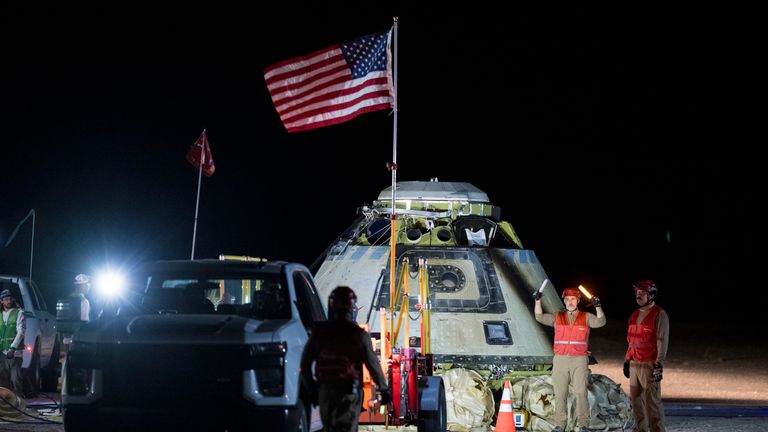
Two astronauts left behind on ISS as troubled Boeing Starliner capsule lands on Earth empty
Boeing’s Starliner capsule, which has been plagued with problems, has returned to Earth, leaving two astronauts behind on the International Space Station (ISS).
The spacecraft – running on autopilot – parachuted into the New Mexico desert six hours after setting out.
Cameras caught the capsule as a white streak coming in for the touchdown at 11.01pm local time (5.01am on Saturday UK time), which drew cheers from Boeing’s Mission Control.
NASA judged it too risky for Butch Wilmore and Suni Williams to get back into the spacecraft.
It means they’ll remain on the ISS until February, more than eight months after blasting off on what should have been a quick trip lasting just eight days.
Shortly after Boeing’s long-delayed capsule was launched in orbit in June, issues were spotted before it arrived at the space station involving multiple thruster failures and propulsion-system helium leaks.
Boeing carried out extensive thruster tests in space and on the ground and said the vessel could safely bring the astronauts back.
But NASA disagreed, preferring to leave them on the station.
There were some snags during Starliner’s reentry, including more thruster issues, but Starliner made a “bull’s-eye landing,” said NASA’s commercial crew program manager Steve Stich.
Boeing has suffered several problems after signing a contract with NASA worth more than $4bn (£3bn) a decade ago, to take astronauts to and from space.
Its first test flight with no one aboard in 2019 ran into so many problems it had to repeat it in 2022, when even more flaws cropped up, and the cost of repairs topped $1bn (£0.76bn).
In contrast, SpaceX’s crew ferry flight later this month will be its 10th for NASA since 2020.
Its Dragon capsule will take off with only two astronauts instead of four, as two seats are reserved for Wilmore and Williams for the return leg.
Starliner will be transported back to NASA’s Kennedy Space Center, where the analysis of what went wrong takes place.
NASA officials stressed that the space agency remains committed to having two competing US companies transporting astronauts.
The goal is for SpaceX and Boeing to take turns launching crews – one a year per company – until the space station is abandoned in 2030 right before its fiery reentry.
That doesn’t give Boeing much time to catch up, but the company intends to push forward with Starliner, according to NASA.
